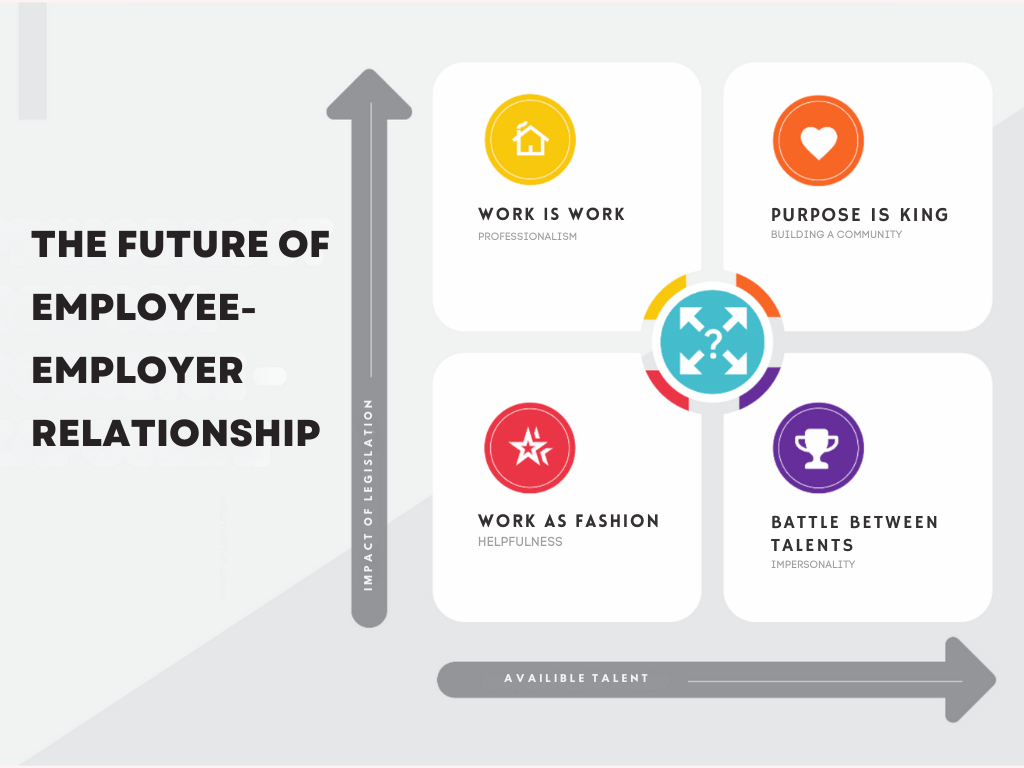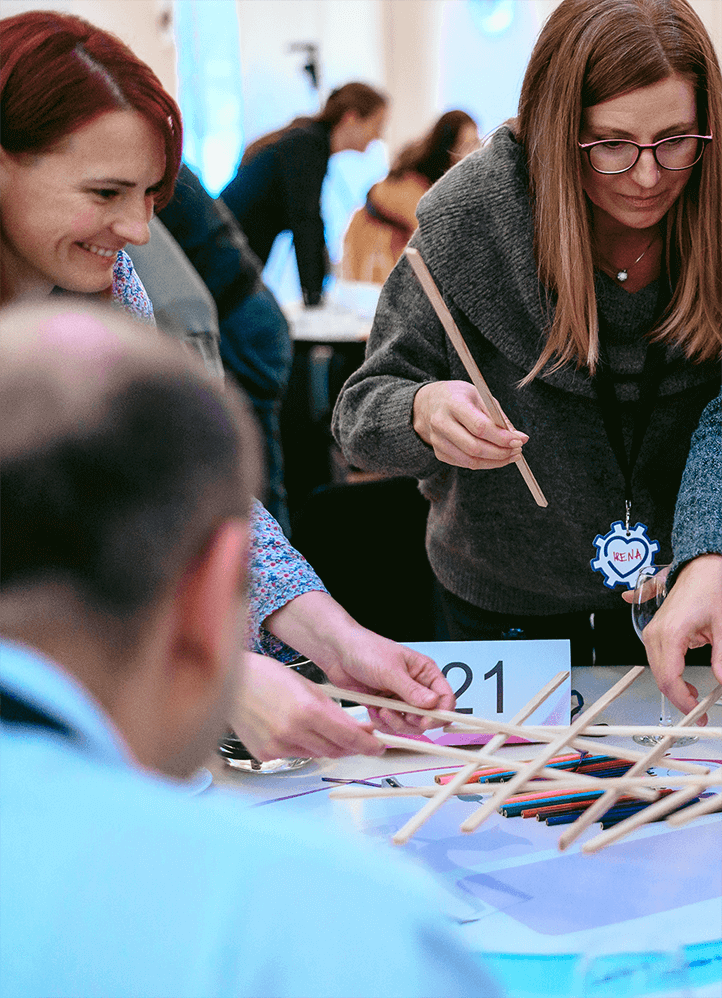
Importance of teamwork and teambuilding in developing the relationship between the company and employees
15 min
Changes and the pandemic have brought unrest to many areas, including the search for the right relationship between employees and employers.
dr. Luka Jan

Program director
Trust him. He's a doctor!dr. Luka Jan
At Deloitte, in their research on trends and simulating various scenarios, it is emphasized that it's crucial to decide what kind of relationship we want. This is a strategic decision that depends on the industry, available talent, employee needs, and company needs.
Regardless of the chosen strategy, we can always find a way within it to develop employees and strengthen teamwork, thus, according to experts at Deloitte, increasing the company's chances of success.
It's not entirely clear where the trend will turn in the future – but during the COVID-19 pandemic, some shifts happened much faster, companies adapted rapidly, as did employees. This meant that we also encountered many unresolved questions:
- To what extent is the company responsible for the health and satisfaction of the employee?
- How can the company ensure uninterrupted operation?
- How much energy and time do employees want to invest in their job and what do they expect in return?
- How to enable at least partial remote work and what does this mean for processes and ways of working?
- How to establish trust when working from home?
- What will be the legacy of a company? What about the values and purpose it pursues and its reputation in society?
Deloitte highlighted two factors that will most influence the development of this employee-company relationship and where the trend will actually turn: talent availability and the impact of legislation.
In the first, the strategy will be dictated by the work environment – how difficult it is to get a job and how difficult it is to acquire appropriate talents for the company. There's a very big difference between low-skilled and highly-skilled workforce. The trend for low-skilled workers shows a need to acquire completely new skills to maintain their jobs, while 70% of companies report difficulty in acquiring suitable highly-skilled workers with a combination of technical knowledge and soft skills, which are becoming increasingly crucial for long-term success.
The second factor that stands out is legislation, as it has largely dictated what companies could and couldn't do, and similar predictions are made for the future, especially in relation to labor law, global warming policy, education policy, and social rights. Here too, employees' expectations of companies are changing dramatically, with an increasing expectation that companies will take a side in some social conflict and provide benefits that the state might not.
Depending on the prominence of one or the other, they predict four possible scenarios for how the company-employee relationship might develop:

Work as fashion is a relationship where companies FIGHT in all ways for rare talents in the market. Salary, benefits, and current whims and moves of the competition lead to quick actions and reactions to expressed employee wishes, without connection to a broader company strategy. Employee loyalty is low, as the main motive is instant benefits – like fashion accessories that can be changed.
Battle between talents is possible with a flood of job seekers and low regulation on the legislator's side. Such a situation can lead to an IMPERSONAL relationship between companies and employees. Workers can be replaceable, so they are more focused on competing among themselves than on the relationship with the company, which usually sees workers only as a cost.
Work is work is an area where employees and companies don't see the need for the company to invest in employees' personal satisfaction. It's a PROFESSIONAL relationship where both partners keep their promises, while purpose and fulfillment are sought by employees outside their organization.
Purpose is king speaks of a scenario where purpose would become the main driving force in developing the relationship between employees and the company. It's a relationship based on COMMUNITY, with a common purpose being the foundation of the relationship and the most important connecting element.
All four scenarios are likely to unfold in the coming years, but which one will be most appropriate for a company will depend on talent availability and legislator constraints. According to Deloitte's research, each of them offers companies three possible choices:
- Instinctive decision - probably the majority of companies responding to the situation by investing minimally in their employees
- Survival strategy - targeted decisions and investment in strategically important HR areas
- Long-term success strategy - consciously investing in employees in line with the bigger picture of the company
Thus, in the analysis, they see investing in employees as an important element for company success even in the battle between talents scenario. They argue that even in this case, good workers will mean good work, and especially that companies with a negative employer brand will find it difficult to adapt to a rapidly changing market if this cannot be solved with artificial intelligence and technology.
This was true, for example, for workers in the service sector during the current crisis, especially in retail chains. Therefore, at the onset of the crisis, many reconsidered whether it was worth staying in such a job. In the USA, companies quickly started offering higher wages and more vacation time to secure staff and growth opportunities as the economy recovered after the removal of COVID-19 restrictions.
And what role do team buildings or complex team events play in each strategy?
Teambulding in the Work as Fashion scenario
Instead of just instinctively responding to the team's desire to go karting for a team building, we can delve deeper and try to understand the team's underlying needs, and find an even better solution. In the long run, we will be successful if we carry out team building in line with the company's values.
At the same time, companies can elevate team events to the highest level and infuse them with company culture, thereby building employer reputation and increasing competitive advantage in the hunt for the best talents with legendary team buildings.
Suggested team building programmes:
Teambuilding in the Battle betweeen Talents scenario
Instinctively, in this scenario, we don't invest in employees as they are "replaceable". A survival strategy would focus on investing where it's really important for the company's operation, which could be accelerating onboarding, investing in leadership development and special skills of employees that are lacking. A long-term decision for success would focus on establishing good jobs because these are also good for business in the long run. This means giving value to individuals, strengthening teamwork and team cohesion, which as such collaborates better and responds to market changes, and greater empowerment of teams in contact with customers to make decisions and solve problems.
Suggested team building programmes:
Teambuidling in a work-is-work scenario
In this context, work allows employees to have financial stability and time to seek satisfaction and fulfillment outside the organization. So in an instinctive response, we assume that it's not necessary to specifically build relationships between the company and employees. In a survival strategy, we mainly focus on creating comfort in the workplace, including acceptance into the team, where team events can achieve a great deal. In a long-term success strategy, we reshape work so that it also becomes a source of satisfaction and fulfillment, thus moving partly towards purpose. It's important that the individual's contribution is visible and important. We ensure that the company's values are clear and properly communicated, where various team programs and quality team buildings can contribute greatly.
Suggested team building programmes:
Teambuilding in the Purpose is King scenario
Here, the main driver of the relationship between the company and the employee is a common purpose. This is like a North Star that shows direction. Purpose is already part of everything the company does in an instinctive decision. If we want to move all the way to the success zone, we're talking about correlation and joint strategic decision-making. Teamwork and team events are at the heart of this strategy, and all reflect the company's values and purpose. Due to sensitivity to inconsistency with purpose, choosing the right and meaningful team activities is very important.
Suggested team building programmes:
- Bridging the Divide
- Custom event
Regardless of the chosen employee-company relationship strategy, investing in teamwork can be the key to ensuring long-term company success and good development of the company-employee relationship. Purpose is becoming increasingly prominent, especially for generations entering the labor market.
SOURCE: Kreag Eaton et al. The worker-employer relationship disrupted. If we're not a family, what are we? 2021 Global Human Capital Trends: Special report. Deloitte 21.7.2021
https://www2.deloitte.com/us/en/insights/focus/human-capital-trends/202…






